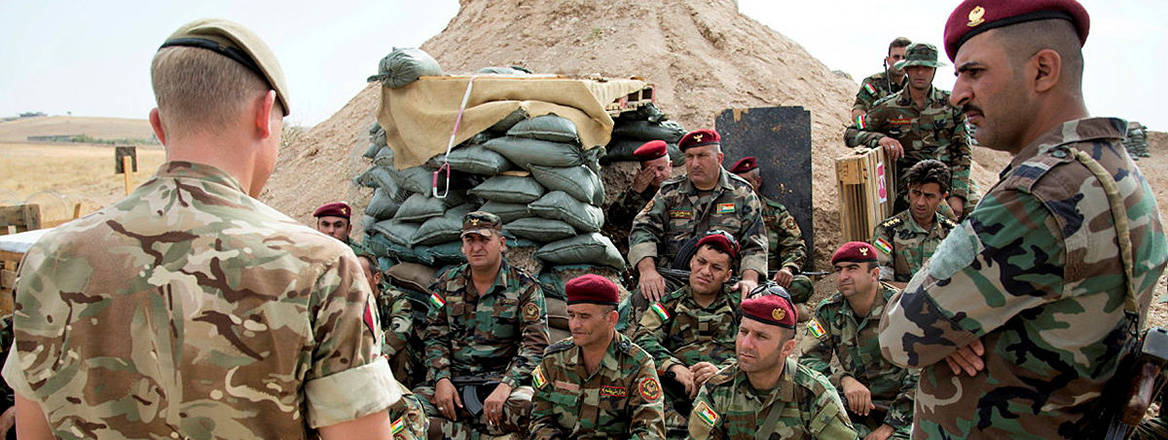Diplomacy Through Defence: Passing Judgement on UK Defence Engagement
With enthusiasm for Defence Engagement seemingly waning, how can Defence ensure that it is contributing to UK influence around the globe?
Although Defence Diplomacy became a Defence Task in 1998, Defence Engagement (DE) only emerged in the 2010 Strategic Defence and Security Review (SDSR). Concerns about warfighting were being displaced by ‘the realities and uncertainties of the 21st century’ and a desire to target the causes of national security risks, rather than managing the consequences. DE would ‘shap(e) the environment, promoting the rules-based international order and preventing instability’. The 2015 Joint Doctrine Note (JDN) definition of DE – ‘using assets (short of combat operations) to generate influence’ – rapidly expanded to include ‘capacity building, access, information and conflict prevention’, typically through High Level Engagements, Short Term Training Teams and Subject Matter Expert exchanges. Over time, ‘Engagement’ became an accepted principle of UK security and a byword for the softer influence that Defence sought to exert through its operations around the world.
A lot has changed. Despite there being clear water between DE and combat operations at its inception, the move to ‘Persistent Engagement’ (PE) has seen a rapid growth in more kinetic partnerships focused on areas such as constraining poaching, drug trafficking and violent extremist organisations. Since Russia invaded Ukraine, warfighting is again the issue of the day. The Army has shrunk by 21%, becoming more stretched than ever. There is a frustration that DE hasn’t delivered, and it seems to be being side-lined; when the House of Commons Defence Committee recommended updating the JDN last year, the Ministry of Defence (MoD) response did not even include the term , referring only to Defence Diplomacy. The 2018 DE budget was £80 million, with the potential for more from the Conflict, Stability and Security Fund (CSSF). By 2022–3, only £3.6 million was explicitly linked to it. Yet the requirement is still being articulated; the first characteristic of the ‘Engage’ function in the Integrated Operating Concept (IOpC) is ‘assuring influence’. Accordingly, some force elements still appear firmly committed to DE; the Defence Medical Services have a significant DE-specific budget, UKStratCom has a regular 2* DE steering group, and a recent think tank meeting heard that ‘50% of the Fleet undertook DE activity in 2023’.
DE’s problems lay not in the concept of leveraging influence to prevent and resist security threats. It lay in the definition of ‘influence’. There simply wasn’t one, even in the eponymous JDN. Even the IOpC didn’t define it, despite stating that we would ‘develop’, ‘regain’, ‘project’, ‘assure’ (x2) and ‘secure’ it. This recently led a Global Defence Network (GDN) colleague to say that it was ‘undefinable’. Lacking a clear ‘theory of victory’ around influence, how could Defence construct strategies to deliver it, or know if it had? Unsurprisingly, the Foreign, Commonwealth and Development Office concluded in 2021 that there was no viable means of measuring it – a real problem given ‘there are hard choices to be made. Not least where, how and when engagement offers political access and value’.
As DE fell out of favour, Strategic Communication (StratCom) made a strong bid for ownership of the elusive influence. In 2019, the UK’s StratCom doctrine reframed all activity – physical or information – as contributing to influence. This led to a meaningful NATO definition of influence in 2023: ‘effects on the perception, attitudes and behaviours of an audience … achieved deliberately by information and communication activities, or as a second and third order effect of all activities’. It also became the central pillar of the concept of Orchestrated Military Strategic Effects (OMSE).
Defence Engagement’s focus should firmly be on actors who do not yet support UK interests effectively – either shaping their intent to support the UK, building their capacity to do so, or both
There is, however, a big problem with this approach. All doctrine (including OMSE) has consistently implied that influence modifies behaviour – be it voting a certain way in the UN General Assembly, choosing a trade partner or being deterred from a course of action. Behavioural science (the well-established academic field relating to behavioural change) has a fundamental rule that the desire to change is inadequate by itself. Without capacity – the necessary tools, know-how and permissions (individual, cultural and legal), intent cannot translate to action. Motivation and capacity together result in change. So StratCom’s changes in perceptions and motivation are inadequate for the task on their own. Capacity is measurable and can be built up if insufficient – just not by StratCom.
The other contender for the now-vacant throne of DE is the related concept of PE. Certainly, PE would seem to be an effective tool for capacity building, at least in terms of the tools and know-how. While PE readily enhances access and counter-adversary activities at the tactical and operational levels, it is not clear that it increases public or international influence (needed to ‘grant permission’ for change). It also tends to be single service-led, and so one wonders how well it can ever truly be coordinated by a centralised StratCom function to meet the demands of OMSE.
So, the UK’s current approach may still be a missing a vital element. What needs to change to fill that gap? First, Defence needs to be very clear about what the Engage space is for. If it truly includes shaping the behaviours of potential allies and adversaries alike, then it must implement a whole-system approach to doing so, ensuring all the apposite instruments (Global Defence Network, UK StratCom, Intelligence, Special Forces and the Single Services) are involved at every stage. Next, there needs to be an evidence-based articulation of how military activities can engender relevant changes in behaviour, not just perception. Lastly, a robust assessment, monitoring and evaluation framework must be in place so that Defence understands the cost, benefit and what works – the ESCAPADE database was simply not up to the task. DE struggled with all of these, but there is little sign that newer approaches are addressing them any better.
The targets of the activities might change too. Why invest in the ability to modify the behaviour of an ally who already routinely supports UK interests? That is not to say that Defence should ignore them, but rather that it should focus on reinforcing interoperability and demonstrating the UK’s commitment to mutual support – a different set of activities entirely. DE’s focus should firmly be on actors who do not yet support UK interests effectively – either shaping their intent to support the UK, building their capacity to do so, or both. This requires Security, Policy and Operations to clearly articulate and prioritise desired behavioural changes, something it has not always managed.
Defence must be certain that it is happy to lose Defence Engagement’s strategic influence function, and if it is not, it needs to act; the UK’s adversaries are absolutely not prevaricating in this space
Perhaps most importantly, existing expertise in behavioural change and capacity building must be exploited and developed. Involvement of the reserves should be routine, as should introduction of (and handover to) the civilian institutions that hold much of the UK’s national soft power (and which are often resourced with international engagement in mind). Further professionalising the DE career will serve to act as a recruitment and retention tool, boost the capacity to iterate and develop, and establish the UK as a world leader in the field (which would itself offer DE opportunities).
So, what of DE in 2024? Defence seems uncertain. Has it simply rebranded DE, believing that influence is completely captured between effects-based StratCom and PE? Or has it decided to limit its contribution to UK influence, falling back on the excellent work of the Defence Attaché network and reinvesting the resources into other subthreshold operations? The concern must be that, by just culling DE without the right mechanism to replace it, Defence will simply go back to 2010 – recognising that the UK possesses dwindling hard power and is in need of reliable partners, but uncertain about how to court them. Defence must be certain that it is happy to lose DE’s strategic influence function, and if it is not, it needs to act; the UK’s adversaries are absolutely not prevaricating in this space. Addressing the flaws of DE though a prioritised, coordinated and evidence-based approach to behavioural change (which would include PE and StratCom) should deliver the Engage/Constrain effects that Defence seeks. Ignoring them will simply propagate the problems; OMSE will fail and be replaced at the next SDSR by another concept with the same problems, while the UK continues to fret over the increasing gap between its influence and that of its adversaries.
The views expressed in this Commentary are the authors’, and do not represent those of RUSI or any other institution.
Have an idea for a Commentary you’d like to write for us? Send a short pitch to commentaries@rusi.org and we’ll get back to you if it fits into our research interests. Full guidelines for contributors can be found here.
WRITTEN BY
Si Horne
Former British Army Visiting Fellow
Ian Gurney
- Jim McLeanMedia Relations Manager+44 (0)7917 373 069JimMc@rusi.org



